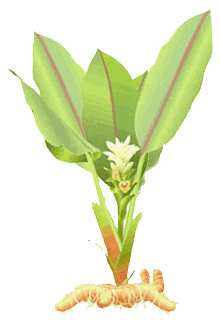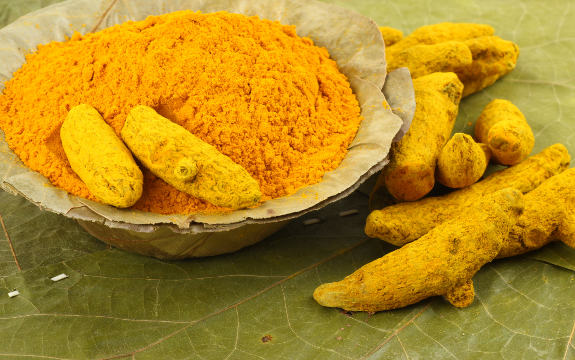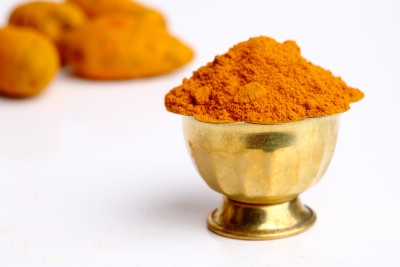
Himalayan Turmeric – Haldi
Himalayan Turmeric-Haldi
Unveiling the Golden Essence of Himalayan Turmeric
The Himalayan Turmeric, also known as “Haldi,” possesses a deep golden-orange root that emits a captivating earthy scent and flavor. This potent spice stands as a staple in Indian cooking, infusing dishes with a distinct color and a rich, warm taste. Yet, its importance extends beyond its culinary allure. For centuries, traditional medicine has harnessed the remarkable healing capabilities of turmeric.
A Journey Through Time: Turmeric’s Culinary and Medicinal Legacy
Embarking on a historical voyage, we trace the legacy of turmeric as a treasure trove of culinary delight and medicinal prowess. Its presence in Indian cuisine spans centuries, infusing dishes with visual vibrancy and deep-seated flavours. Yet, turmeric’s allure extends beyond culinary realms; it emerges as a revered medicinal companion, lauded for its potent healing ability.
The Radiant Emblem of Gastronomy and Healing
Himalayan Turmeric Haldi boasts one exceptional quality: a captivating deep golden-orange root with an earthy aroma and flavour. This vibrant spice is integral to Indian gastronomy, enriching dishes with its distinct hue and warm, abundant taste. Nevertheless, its significance surpasses the boundaries of the kitchen; turmeric has graced the shelves of traditional medicine cabinets for millennia and is celebrated for its remarkable curative attributes.
Elixir of Wellness: Turmeric’s Anti-Inflammatory Marvel
Among turmeric’s celebrated qualities, its robust anti-inflammatory prowess takes centre stage. The curcumin compound nestled within turmeric naturally wields anti-inflammatory properties, making it a valuable asset in holistic well-being. This golden gem has been harnessed to alleviate discomfort related to arthritis and joint issues, extending a hand of relief and amplifying mobility.
Unmasking the Multifaceted Benefits of Himalayan Turmeric
The journey into Himalayan turmeric haldi’s benefits unveils vibrant hues and complex aromas. As this radiant root graces dishes and cups, its potential extends beyond taste and fragrance. Its warm, deep shade mirrors its ability to infuse dishes with visual splendour and healthful advantages. Moreover, the healing prowess of turmeric reaches out to bolster digestive health and fortify the immune system.
A Timeless Emblem of Vitality and Wisdom
The allure of Himalayan Turmeric, or Haldi, remains undiminished by time’s passage. Beyond its gastronomic role, it stands as an emblem of natural wellness. Amidst the enchanting aroma and vivid flavours, remember that this golden treasure signifies more than a culinary spice. It encapsulates age-old wisdom, embracing the potential to elevate palate and vitality.
There are thousands of publications and research papers on our Golden Spice.
Below are a few interesting articles regarding Turmeric; further information can be found in these source files.
SOS Organics Himalayan Turmeric is grown in the Kumaon area of the Himalayas
1. Turmeric produces mind-blowing recovery from dementia symptoms, multiple case studies show. Effect on Alzheimer’s Disease. Anti Oxidant. Anti-inflammatory. Lowering Cholesterol.

Passage from this research: Curcumin (Curcuma longa – Haldi) is the source of the spice Turmeric and is used in curries and other spicy dishes from India, Asia and the Middle East. Like many other herbal remedies, people first used curcumin as a food and later discovered that it also had impressive medicinal qualities. It has been used extensively in Ayurveda (Indian system of Medicine) for centuries as a pain-relieving, anti-inflammatory agent to relieve pain and inflammation in the skin and muscles. It has also proven to have anti-cancer properties. Curcumin holds a high place in Ayurvedic medicine as a “cleanser of the body,” Today, science is finding a growing list of diseased conditions that the active ingredients of turmeric can heal.
2. Synopsis of Turmeric’s Healing Properties and Use.

Portion from this analysis: The main organs turmeric treats are the skin, heart, liver and lungs. Turmeric is used for epilepsy, bleeding disorders, and skin diseases, to purify the body-mind, and to help the lungs expel Kapha. Activities of Turmeric include Alterative, analgesic, antibacterial, anti-inflammatory, anti-tumour, anti-allergic, antioxidant, antiseptic, antispasmodic, appetiser, astringent, cardiovascular, carminative, cholagogue, digestive, diuretic, stimulant, and vulnerary. Therapeutic uses of Turmeric: Anemia, cancer, diabetes, digestion, food poisoning, gallstones, indigestion, IBS, parasites, poor circulation, staph infections, and wounds. Turmeric helps regulate the female reproductive system and purifies the uterus and breast milk; in men, it purifies and builds semen, counterintuitive for an aromatic bitter. Turmeric reduces fevers, diarrhoea, urinary disorders, insanity, poisoning, cough, and lactation problems in general. Turmeric is used to treat external ulcers that respond to nothing else. Turmeric decreases Kapha and so is used to remove mucus in the throat, watery discharges like leucorrhea, and any pus in the eyes, ears, or wounds, etc. In Ayurvedic cooking, turmeric is everywhere; this multifaceted wonder spice helps.
3. Turmeric’s cardiovascular benefits were as powerful as exercise. (this web page links a few dozen research papers on the relation of turmeric and cardioprotective properties.)
Excerpt: While many foods are powerful health enhancers, curcumin alone is known to impact over 560 diseases, according to peer-reviewed research. Beating cancer with nutrition means learning how the foods people eat daily can be utilised to treat or prevent illness and disease. While the advancements humanity has made throughout history are great, mainstream medicine has been going down a dark road. It is time to shift from a pharmaceutical-dependent state to nutrition-based prevention and treatment.
4. Beating Cancer with Nutrition – Turmeric Slows Spread of Breast Cancer.

Segment from this investigation: According to peer-reviewed research, while many foods are powerful health enhancers, curcumin alone is known to impact over 560 diseases. Beating cancer with nutrition means learning how the foods people eat daily can be utilised to treat or prevent illness and disease. While the advancements humanity has made throughout history are great, mainstream medicine has been going down a dark road. It is time to shift from a pharmaceutical-dependent state to nutrition-based prevention and treatment.
5. A new study published in the journal Phytotherapy Research has confirmed for the first time in a randomised, controlled clinical trial that the primary polyphenol in turmeric known as curcumin is safe and effective in treating severe depression.
6. Turmeric Superior to Chemical Mouthwash In Improving Oral Health

Selection from this scholarly work: Since ancient times, turmeric has been used for remedying oral ailments, among other therapeutic applications too numerous to count. Consider that plants like turmeric were first eaten thousands of years before our species devised the modern-day oddity of encapsulated or tableted extracts that could be swallowed without significant oral contact. Therefore, It is logical that after long stretches of biological time, taking root orally as either food, spice or medicine would agree with and benefit that part of our anatomy and its unique physiology. Indeed, recent research shows that turmeric extract and turmeric oil may even reverse precancerous changes in oral submucous fibrosis in humans. In addition, at least a dozen studies show that turmeric extract can kill oral cancer cells, including a recent study showing that turmeric extract-loaded nanoparticles kill chemotherapy-resistant oral cancer cells. But turmeric’s positive role in oral health encompasses more than relatively rare health issues like oral cancer, as it also has tangible value to the vast majority of folks who use ordinary mouthwash to keep their mouth clean of plaque.
7. An extensive collection of hundreds of research papers on Turmeric
8. The effect of curcumin (turmeric) on Alzheimer’s disease
Abstract: This paper discusses the effects of curcumin on patients with Alzheimer’s disease (AD). Curcumin (Turmeric), an ancient Indian herb used in curry powder, has been extensively studied in modern medicine and Indian systems of medicine for the treatment of various medical conditions, including cystic fibrosis, haemorrhoids, gastric ulcer, colon cancer, breast cancer, atherosclerosis, liver diseases and arthritis. It has been used in various treatments for dementia and traumatic brain injury. Curcumin also has a potential role in the prevention and treatment of AD. Curcumin, as an antioxidant, anti-inflammatory and lipophilic action, improves the cognitive functions in patients with AD. A growing body of evidence indicates that oxidative stress, free radicals, beta amyloid, cerebral deregulation caused by bio-metal toxicity and abnormal inflammatory reactions contribute to the critical event in Alzheimer’s disease pathology. Due to various effects of curcumin, such as decreased Beta-amyloid plaques, delayed degradation of neurons, metal-chelation, anti-inflammatory, antioxidant and decreased microglia formation, the overall memory in patients with AD has improved. This paper reviews the various mechanisms of actions of curcumin in AD and pathology
9. How curry spice helped a dying woman beat cancer
Sufferer, 67, turned to kitchen cupboard staple turmeric after five years of failed treatment
She was diagnosed with the blood cancer myeloma in 2007 and underwent three rounds of chemotherapy as well as four stem cell transplants
She tried Curcumin, a component of turmeric, and five years on, her cancer cell count is negligible, with her recovery featured in the British Medical Journal
Curcumin has been linked to a host of benefits, including for heart disease
- Lifestyle Blogs







